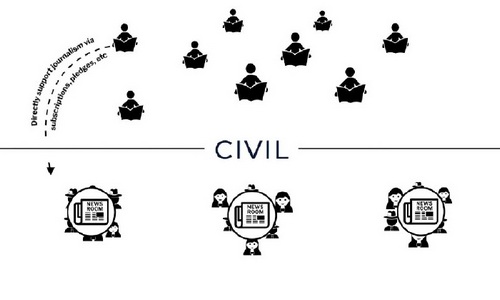Journalism is in a crisis. The Washington post reported on a decline in the number of journalists in the United States. In an article the Post proposed that the nonprofit sector should play a bigger role in supporting journalism for the sake of democracy in the United States.
We are seeing declining numbers of journalists, as well as declining credibility and trust in the news media. The coverage of certain news-worthy stories is tainted, leading readers to either dismiss outlets altogether or to ascribe to particular outlets that serve to confirm their biases.
Governments are also known to crack down on media outlets. Chinese censorship, for example, is prominent, as is censorship in countries like Iran. Western democracies also have politicians and leaders who criticize the media to a point at which their followers automatically dismiss media outlets altogether.
Donald Trump’s attacks on what he deems “fake news” are especially prominent. Readers are turning more and more to partisan news outlets, and it is difficult to know which sources are trustworthy in the deluge of information. Blockchain initiatives can provide solutions to these problems, and Civil is one of the projects taking this challenge on.

What is Civil?
Civil is a blockchain platform for news where newsmakers have direct contact with their public; advertisers and big corporations are ruled out of the model. Civil wants to fight fake news with blockchain. It is a platform that seeks to disrupt the journalism industry by introducing a new ad free, crypto-economic business model. Their token, CVL, is going to be released this year. Newsmakers and the public can be token owners and can use their CVLs to vote for the credibility of a given newsroom to have them remain in or be erased from a Token Curated Registry.
Token Curated Registries
A Token Curated Registry is basically a list, like so many we see on the centralized web (think of all the lists we see on the internet, “best restaurants of New York City” for example). Token owners then expend tokens to vote for an item to remain or be taken off the list. CVL token owners vote according to adherence to the Civil constitution, a document outlining the principles of the Civil ecosystem.

Is Civil Journalism-Focused or Popularity-Driven?
Civil describes itself as a journalism-focused venture-builder for the decentralized web, a journalism marketplace that isn’t controlled by billionaires. There are already a few “newsrooms” on board, basically journalism start ups that are receiving funding from Civil (a portion of which will come in the form of CVL tokens) to create news content that will go up on the blockchain ecosystem. One of these newsrooms is a podcast called ZigZag by renowned journalist Manoush Zomorodi. One of the cool features Civil is introducing is the news content will be encrypted and stored in a blockchain, making the digital content less ephemeral than our current internet archives.
Civil is receiving $2 million in funding from the European Journalism Centre and $5 million from Consensys, the Ethereum venture capitalist firm. But the way Civil is set up with its token-based voting mechanisms and the entities that are funding it, may taint the project. Civil might end up being little more than a blockchain-powered version of the journalism it is trying to reform or replace. Civil can turn into a platform that publishes and keeps the most popular stories out there, not necessarily the most truthful.
Civil Part of a Greater Trend
Our current business models don’t work on decentralized platforms. Civil is trying to disrupt the current business model of the news industry by handing control over what content is voted in and out to its token owners – its users – which just takes another flawed mechanism already present in centralized platforms, onto the blockchain.

